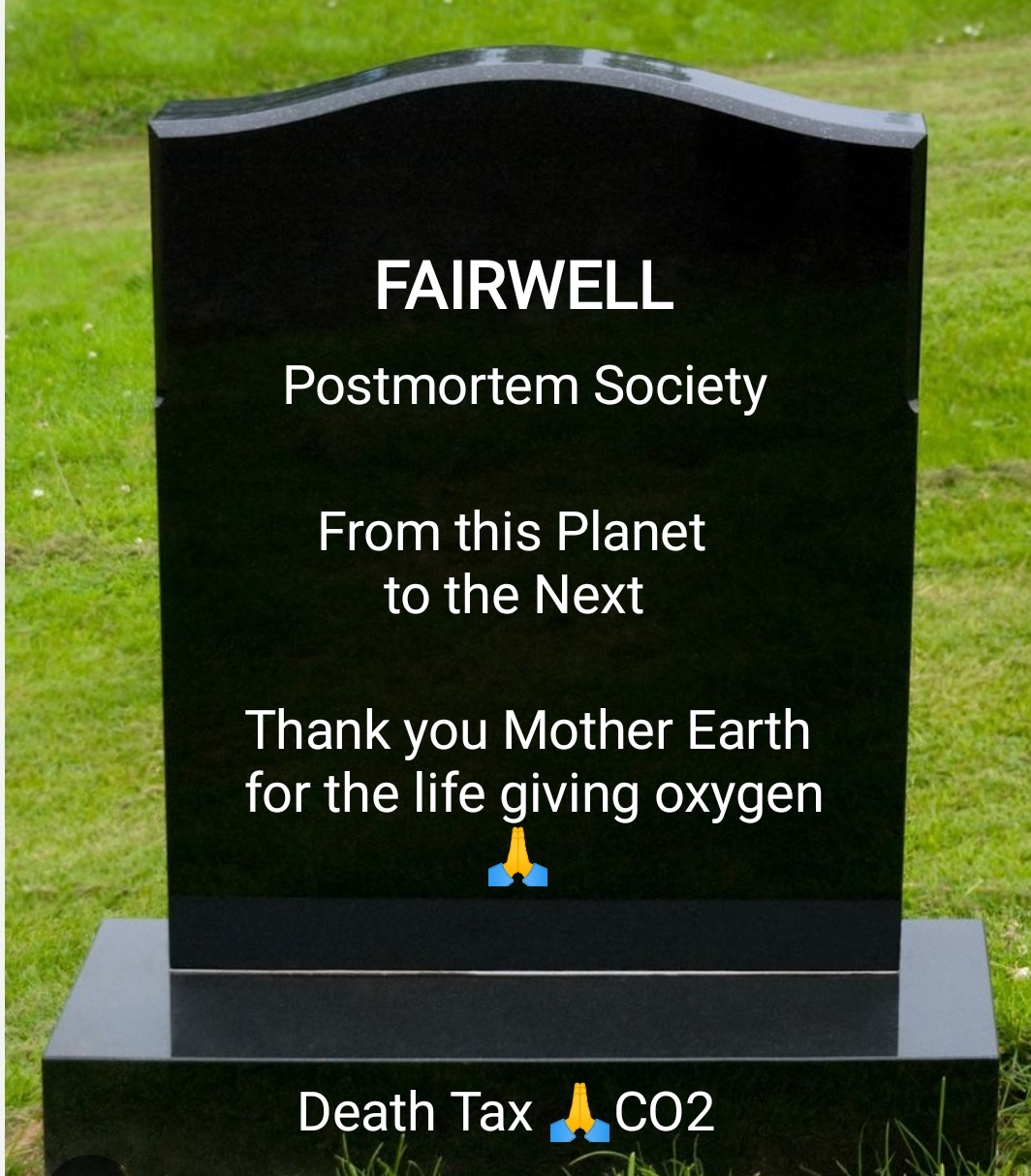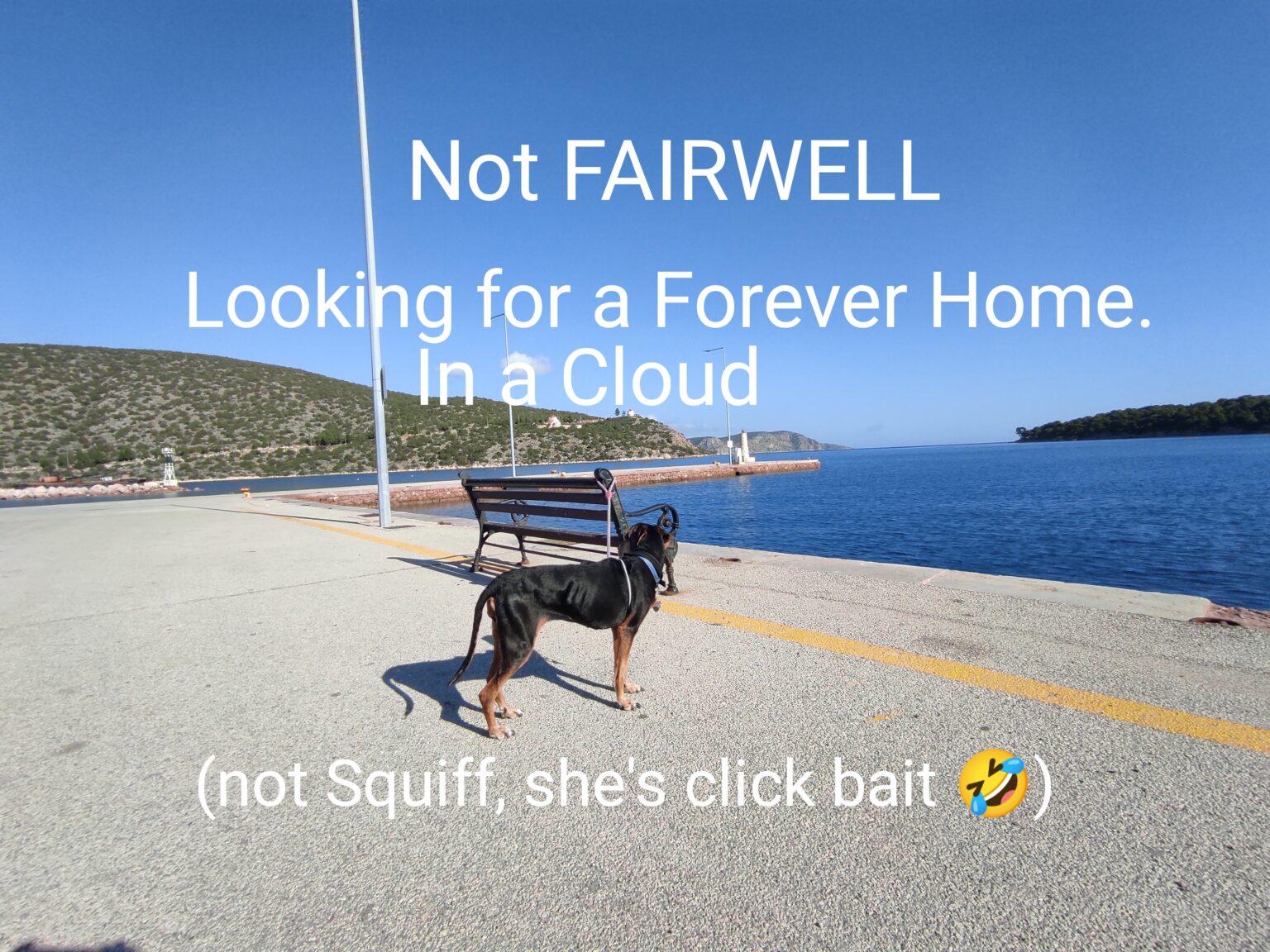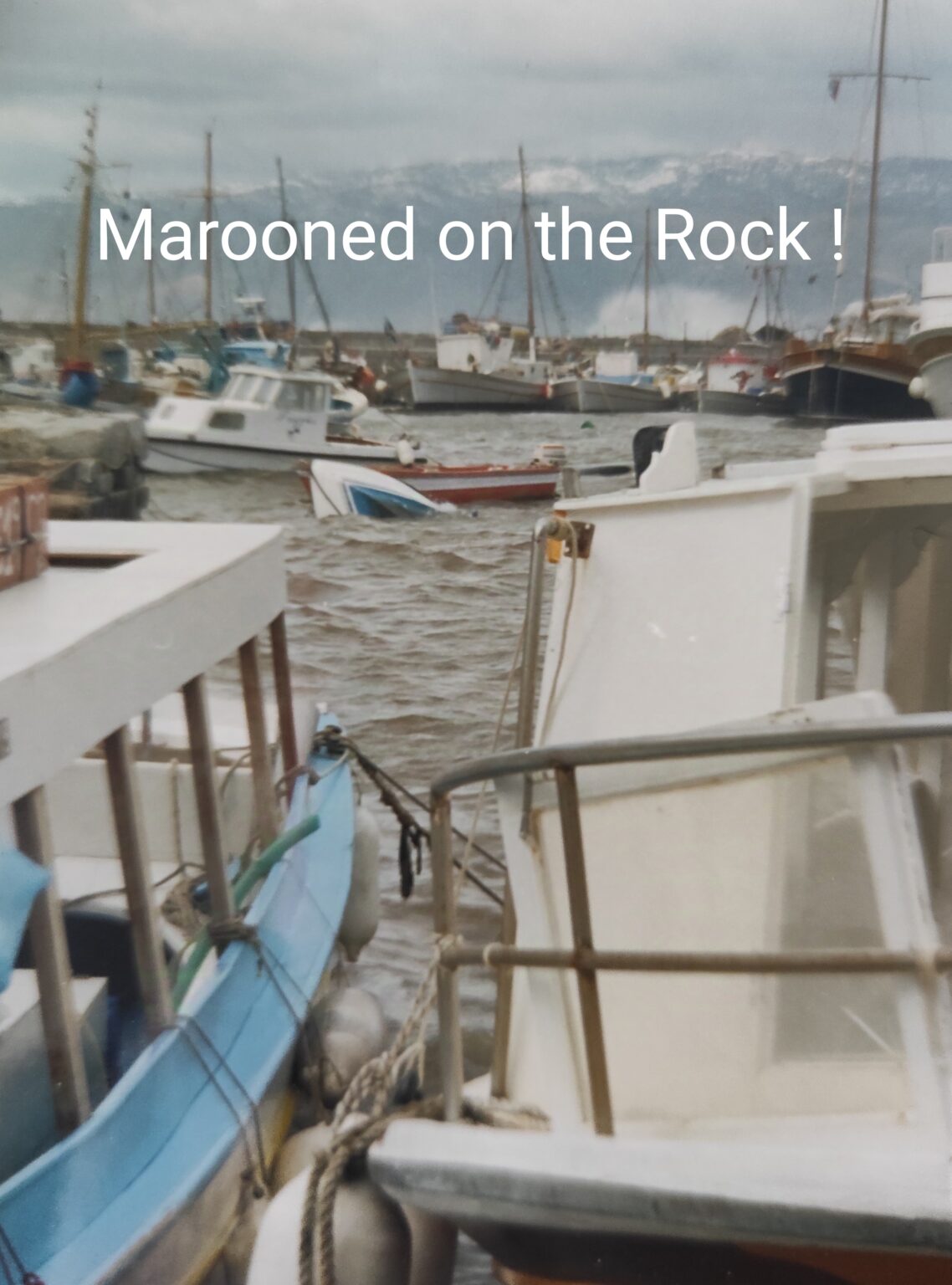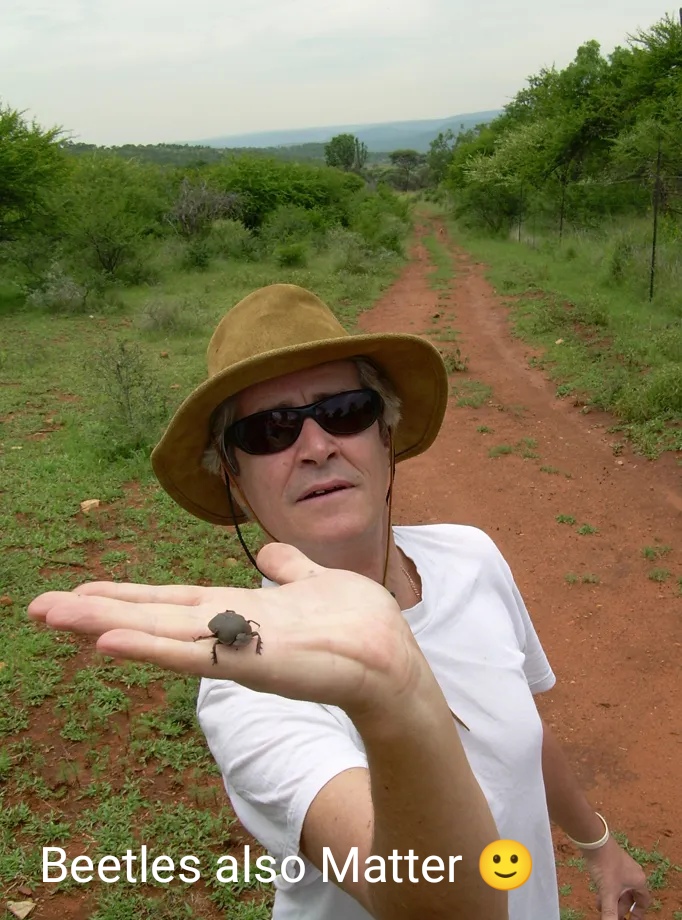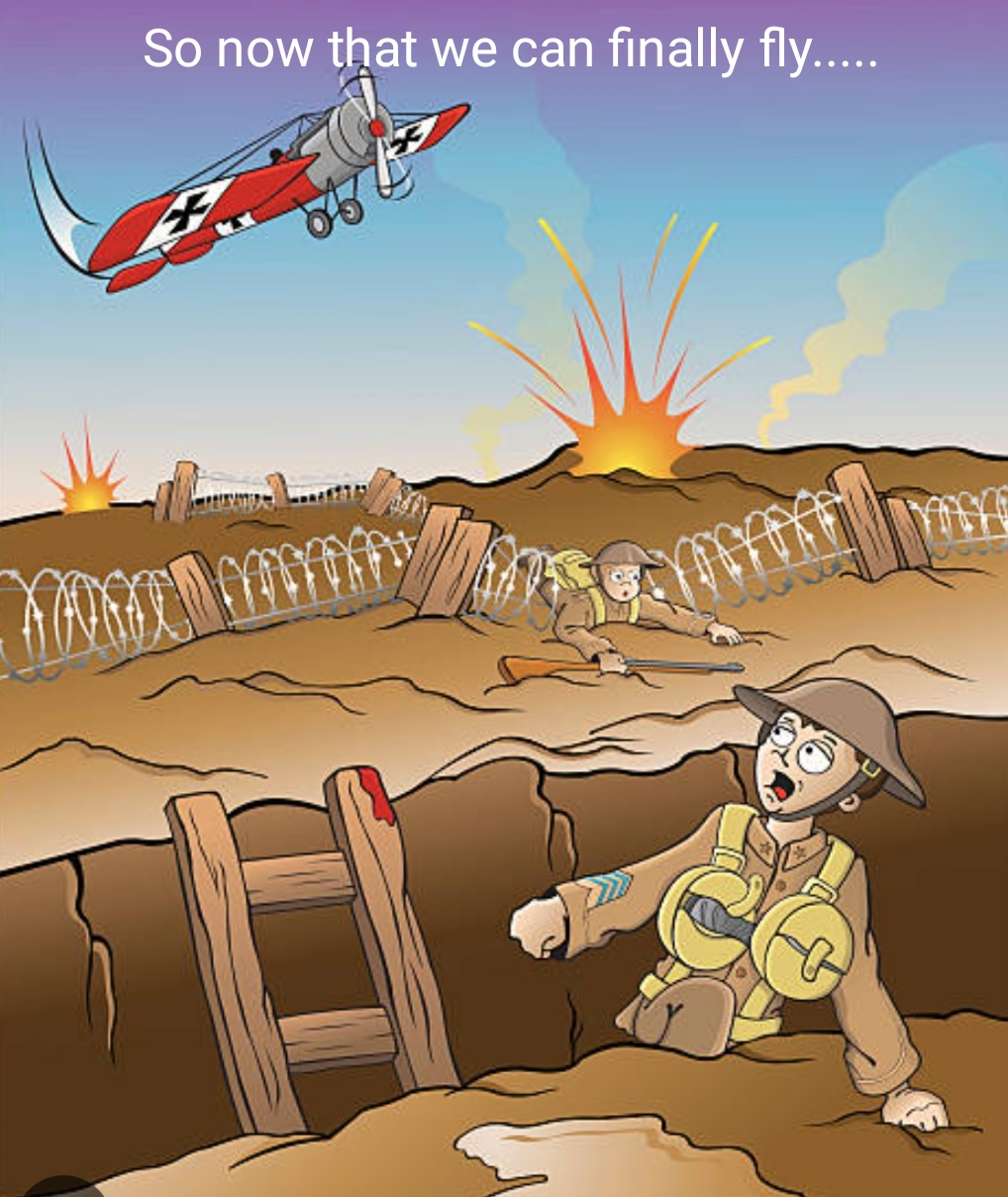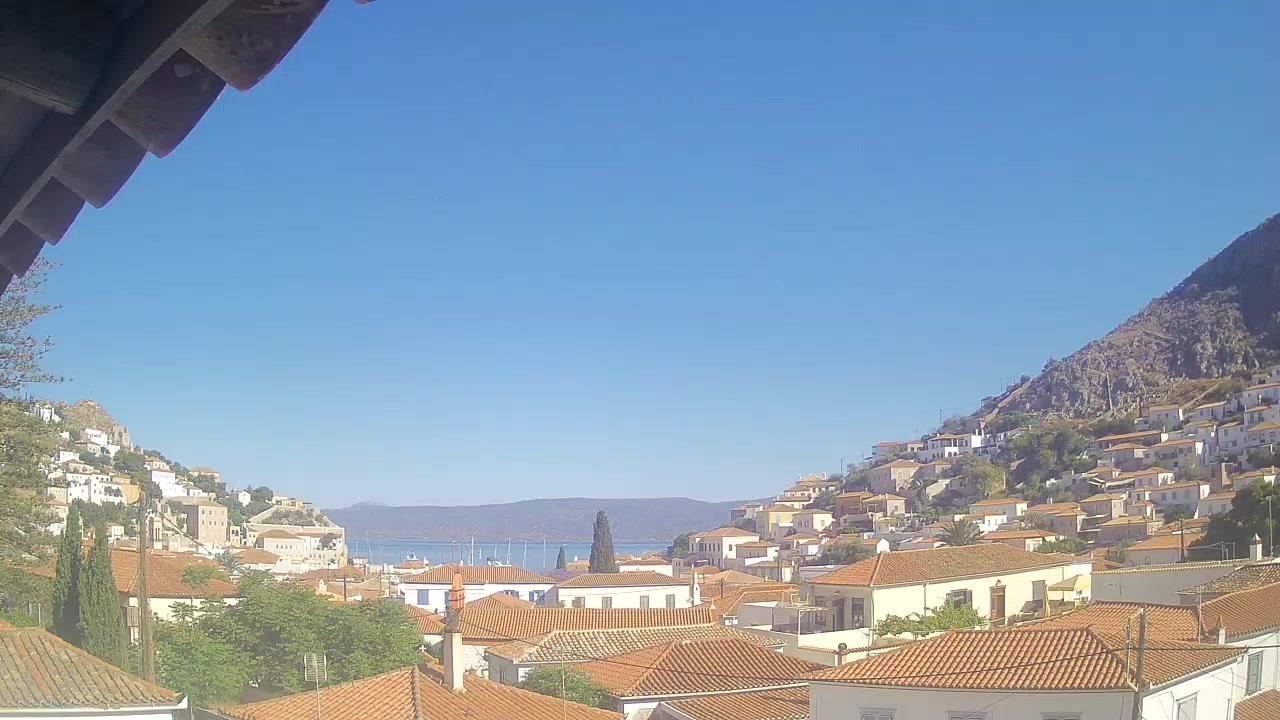Hydra imposes unilateral Blockade
It’s not often that a rumour will entice us to venture into the megopolis of Hydra port to verify the authenticity of a rhubarb, but this was one that needed a firsthand ‘eye-report’. This month Kamini village gossip had it that Hydra was defying maritime and governmental authorities by blockading the harbour to all incoming major sea traffic including our only lifeline to the mainland, the hydrofoils.
Sick of being held over a financial barrel over its transport system to the Big Olive by a single ‘greedy’ shipping monopoly, the citizens of our island decided to take matters into their own hands. With no large ferry to the Rock, Hydriotes have been forced to use the only daily transport into Piraeus, which is not only expensive but baggage prohibitive, being that the hydrofoils limit the amount of goods one may carry.

On the 13th and 14th of November ropes, and a string of ciaques blocked the entrance to the port, physically preventing boats from entering. But, in typical Hydra fashion, instead of the protest turning into a naval confrontation, it turned into a party, despite the inconvenience. Blaring music, the odd megaphone speech, and a general festive atmosphere prevailed.
My wife, Jennifer, who rarely leaves the Rock, had gone into Athens to see a friend off and show her the sights, was marooned for three days. Alternatives, such as hiring and taxi and then acquired a blockade-busting Hydra water taxi into Kamini was just too expensive and impractical to justify the trip.
The blockade attracted national media and brought the island’s plight to the attention of a flawed and unjust commuting system.
The major point of the grip was to highlight the fact the hydrofoils servicing the island are way too old, over 35 years, prone to breaking down, and below normal safety standards. Being that it coincided with one of the Rock’s major holidays, St. Konstentine our patron saint, even the Senior Orthodox Beards were forced to come a couple of days early to commemorate the event.
As yet there is no clear outcome to this naval action, but as soon as there is some sort of resolution we will post the result. Whilst it is not our policy to delve into local politics, one rhubarb which did get loud in the local taverna, was that an almost ex-mayor (no names obviously) turned up with some of his PASOK cronies and tried to steal the limelight, and pissed off many residents in the process. And it was said, hijacked the real cause for our self imposed blockade by turning it into a self motivated political agenda
Alien Abduction in Kamini
Summer was nearly over, most of the tourists had gone home, and the island was ours again. Not that we mind the holiday makers. Au contraire! Most of them are quite generous and friendly, often stopping for a little chat. Still, it was nice to have some peace and quiet in the village for a change.
It was that time of year when it’s still lazy-warm and the cold, wet winter remains a distant concern. I was lounging in my favorite spot, on a doorstep overlooking the Saronic, soaking up the afternoon sun, when They came, disguised as late summer tourists.
“Here kitty-kitty. Tut-tut-tut.”

They approached in a most beguiling manner, one waving a tantalizingly smelly tin, the other straggling behind lugging what looked like a square suitcase oddly draped in cloth. Normally I allow such specimens to stroke my chin if they choose to as they pass, but then, one approached even closer, and I heard,
Clink, clink, clink. “Hello, little kitty. Who wants a yummy snack? How about a tasty sardine for the nice kitty?”
Never one to say no to such delicacies, despite the baby talk, even in the height of summer, I popped up to receive this kind surprise treat—and that’s when it happened.
Without warning, I found myself grabbed by the scruff of the neck and stuffed unceremoniously into the suitcase, which, as it turned out, was a plastic cage. The gate slammed shut like a prison door before I had time to retaliate and make my assailant bleed.

Then they covered me with the cloth and, grunting and panting, carried me through miles of enemy territory. Though I couldn’t see where they were taking me, my nose told me we’d long left the village. When at long last we arrived at their lair, others were waiting. They removed the sheet and my captors peered down at me for a while, smiling and nodding, apparently quite proud of themselves for their treachery. I was not their sole victim. I could smell others of my kind in the room, but they were all strangely silent.
Suddenly, my cage began to shrink, compressing me until I was trapped between its sides, unable to move a claw. Then, one of Them approached … and everything went black.

I awoke, mysteriously transported back to my old doorstep, with a tremendous hangover. I wondered at first if the whole thing had been a terrible dream. But I have evidence. My abductors shaved my flank. I don’t know what they did there—it’s a little sore—but life has definitely been different since. None of the local guys, usually so demanding and persistent, give me a second glance anymore. Some actually avoid me! I honestly can’t say I mind. I might actually get some rest this winter.
I’ve since spoken to a few of my girlfriends in the neighborhood who also claim to have had this bizarre experience to similar happy effect. I’ve asked a couple of the guys, but they either yawn indifferently and tell me they have no idea what I’m talking about, or they slink away quickly, muttering. I don’t suppose everyone’s terribly happy about the recent changes. We’ll have to see how it goes, but I’m beginning to think these aliens did us a huge favor.

HydraArk brought two Irish vets to the island who spayed/neutered and treated around 60 cats
in mid-September. To learn how you can help, please visit www.HydraArk.org for details.
Theo’s narrow escape
I have always said that the key to a successful life in Hydra is to throw away the rule book, because everything in this part of the world is more or less the opposite to the norm. Keys will turn the wrong way, neh means yes, a nod means no, and roosters may crow at sunset, but none of these contradictions is more striking than Theo’s advice to us during the first week of September.
 Theo reassures patrons that despite bruised bum,
Theo reassures patrons that despite bruised bum,
he’s still serving the “same old rubbish.”
“If crossing a road in Athens, always do it when the little red man is lit,” he said after limping over to our table at his restaurant, the Pirofani. “If you cross when it’s safe, when traffic has stopped and the little green man is illuminated, you have more chance of being run over.”
“The reason is that when you cross on red without the ‘safety’ light, you are aware and you look around, left and right, and dodge traffic. When walking across the street on green, particularly when traffic has stopped, one doesn’t pay as much attention and one’s guard is down—and that is when disaster can strike.”
Not only is it out of the ordinary for someone who lives on a vehicleless Greek island to be hit by a car on the odd occasion when they do visit the Big Olive, being that the odds are much reduced and the chance of incidence minimal, but to be told to break the rules seemed odd.
Theo had popped into Piraeus to purchase some supplies for the restaurant and was crossing the main road on his way to catch the return hydrofoil when he got smacked in the middle of a pedestrian crossing while crossing on a green light.
“Normally I’m in a rush, so I nip across roads without using the pedestrian crossings, ducking in and out, and I’m alert,” he added. “But this time I wasn’t in any particular hurry, and I was carrying bags of supplies—luckily.”
Theo waited patiently for the green man, then for a car stop, and had finally proceeded to cross when suddenly he found himself flying through the air. A truck had smashed into the back of the stopped car, which in turn shot forward and hit Theo.
“It was most fortunate that I was carrying a big bag of soft sponges and cleaning materials that cushioned the blow. Otherwise it would have been metal against bone and Lord knows what I would have suffered,” he philosophized. “Somebody up there was looking after me—goodness knows why!”
Okay, Let There Be Light!
 Kamini Village during one of Hydra’s nightime blackouts
Kamini Village during one of Hydra’s nightime blackouts
Ironic, really, that last month we suggested there be light … sometimes. In March, the DEH really took us at our word: no light … sometimes.
By the time the third consecutive week of nightly blackouts came around, even the stoic Kaminites were beginning to grumble. The ongoing rolling and random electricity cuts—often twice a day for hours on end —were affecting everyone’s mood. Nobody knew when the next would occur, making it hard to plan any sort of schedule, work or domestic.
Granted, about ten days into the crisis, Kontelania taverna had a installed a generator, a beacon of light in a pitch black valley, but the novelty of sitting by candle light in the gloom had worn patience thin.
It must be said that whilst mountains of skoopethia (rubbish) mounted on Athenian pavements, our local garbage collection went about its work as usual, so we were spared some of the inconvenience much of the rest of the country suffered.
If nothing else, it showed how absolutely dependant upon electricity we have become. Back in the 1980s, its absence was excuse for a prolonged party, but then we didn’t have a variety of entertaining television programs, computers and the Internet, electrical heating/cooling, ATMs, cordless phones (which don’t work in blackouts unlike the old style roto-dial type) and such.
9 1/2 Months

Where else in the world would one consider one’s business day to be hugely successful, cause for celebration in fact, purely because one has managed to get a spare key cut. Granted it wasn’t a task that we pursued with persistent enthusiasm or even monotonous regularity, but we had, on and off, on several dozen occasions taken our key into the city of Hydra with us on the off chance that the island’s sole key cutter was in.
The key-cutting operation is situated in the corner of one of our carpenter’s shops, and due to the nature of their business, being that they may be out fitting doors or windows, they do not keep regular hours. So, more often than not, the shop wasn’t even open when we passed by.
When we did find it open, the key-cutting expert, Spiros, wasn’t there. “Come back in half an hour,” was the standard answer. We did, many times, but our half-hour and his didn’t coincide—for nine and a half months.

To be fair, if the matter had been urgent, we could have waited at the carpenter’s for a few hours or, indeed, taken a boat to Ermioni or Athens and had the key cut, but it was simply something we had on our “to-do” list while in town. This month we were able to tick that item off—almost.
While we couldn’t believe our luck in finding the aforementioned service open, and the expert in situ, things still didn’t go quite to plan. After much rummaging through miscellaneous boxes, it turned out he only had one spare key of our type. We had hoped to get two spare house keys cut—just in case.
We have ordered another and expect, with good fortune and synchronised time pieces, it will be done by November.
